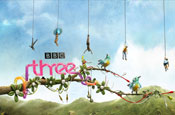With the shadow of looming job cuts hanging over the BBC, last week's relaunch of digital channel BBC Three was a fairly muted affair. The channel, which has been given a fresh look, is aiming to grow its reach and audience share among the 16- to 24- year-old demographic.
Key to this strategy are the launch of a web-simulcast channel, a programming revamp and increased focus on user-generated content. With a budget of more than £100m - almost twice that of its nearest competitor - should the Corporation's commercial rivals be feeling worried?
BBC-bashers have long argued that the marketing power of its own inventory gives it a huge advantage. 'The BBC has the power of BBC One, Radio 1 and BBC Online to cross-promote its digital channels in a highly targeted way,' says Chris Locke, group trading director at media agency Starcom.
Others point to Radio 1 successes such as The Chris Moyles Show as evidence of how much damage the BBC can inflict on its commercial rivals with high-quality programming.
However, the digital TV market as a whole is booming, and despite media claims that the key youth demographic is deserting TV in favour of social networking sites, viewing time among this audience is rising. BARB figures show that the average 16- to 24- year-old now watches 73.8 minutes of multichannel TV a day, up from 45 minutes in 2001. Add to this the 1.5m UK students not included in the data, and a picture begins to emerge of a vibrant market.
It is not surprising, then, that both ITV2 and E4 put in strong performances last year. According to BARB, E4 was the most-watched digital channel among 16- to 34-year-olds with a share of 3.82%, followed by ITV2 with a share of 3.25%. BBC Three is the fifth-most popular channel amongst this demographic, with a share of 1.88%.
Zai Bennett, controller of ITV2, says the 16- to 24-year-old audience is notoriously difficult to attract, but spends a bigger proportion (66%) of its viewing time on multichannel. 'The internet is not stealing all of audiences' time - we are finding that many viewers are using both,' she explains. In response, Bennett is increasing the channel's focus on digital. This has already had solid results, with a Facebook group for fictional call girl Belle du Jour attracting 2000 friends in support of drama The Secret Diary of a Call Girl.
E4 has also invested substantially in digital, and claims that it has always been a pioneer in new media. 'We use the web as a way of deepening our relationship with younger viewers. Skins and Fonejacker had a particular impact online,' says Sarah Martin, marketing manager for the channel.
Yet some believe the commercial channels have simply been lucky that their BBC digital counterparts have been so dysfunctional to date. 'There is no doubt that, if successfully relaunched, the BBC's digital channels could start to erode the share of commercial channels such as E4 and ITV2,' says Locke.
The advertising industry has long argued that all BBC areas of operation are well-served by the commercial sector, but on a cost-per-viewer basis BBC Three is more expensive and therefore more exposed to criticism. 'Obviously there is frustration in the commercial sector over the BBC, but commercial viewing is increasing and the expansion of Freeview is actually boosting the sector and diminishing BBC audiences,' says James Wildman, managing director of advertising sales house IDS.
Some agencies also believe that the relaunch of BBC Three could be good news for advertisers. Phil Nunn, founding partner of Trinity Communications, says the relaunch should be welcomed as it will drive innovation. 'The growing presence of the BBC will force its competitors to invest further in high-quality output, which can only be a good thing,' he explains.
Indeed, the industry as a whole is reluctant to criticise the channel, and has a genuine belief in the value of new and original UK content. 'I don't think BBC Three is anywhere near having the cachet of E4 or ITV2, but it is a completely different concept. It is more of a testing ground for new talent,' says Tess Alps, chief executive of commercial television marketing body Thinkbox.
The sticking point is the channel's substantial investment in Hollywood acquisitions and first-views of US
imports such as Heroes, rumoured to have cost in the region of £500,000 an episode. Moreover, with Gordon Brown said to have voiced concerns about the size of BBC One talk show host Jonathan Ross' mammoth salary, it is not surprising that commercial broadcasters are questioning whether these programmes are the right way for the BBC to be spending public money.
Datafile: BBC Three
- BBC Three launched in February 2003, replacing BBC Choice, the first British TV channel to broadcast exclusively in digital format.
- One of its most popular shows at launch was EastEnders. Episodes were broadcast on BBC Three before airing on BBC One. The channel now screens repeats of the soap.
- In October 2004, BBC Three attracted its highest-ever ratings when 1.8m viewers tuned in for the opening of the second series of comedy show Little Britain. 90% of BBC Three's output is from Britain and other European Union countries; 80% is original.
- According to the BBC, the channel is its 'boldest single investment in the future of Britain's creative talent and brings a distinctive new voice to a generation of young adults'.
- Current programming includes Dog Borstal, Can Fat Teens Hunt?, Family Guy and The Mighty Boosh.


